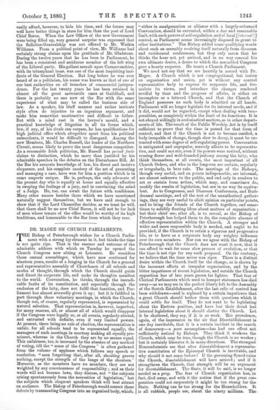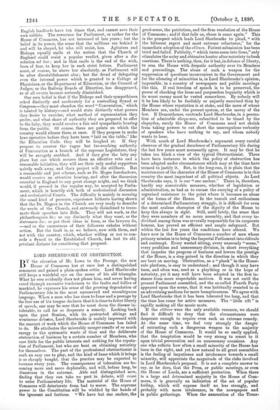DR. MAGEE ON CHURCH PARLIAMENTS.
THE Bishop of Peterborough wishes for a Church Parlia- ment with a strong lay element in it, but thinks the time is not quite ripe. That is the essence and outcome of the admirable address with which on Tuesday he opened the Church Congress now sitting at Leicester. He considers those annual assemblages, which have now continued for nineteen years, results of a longing in the Church for a general and representative assembly of Churchmen of all schools and modes of thought, through which the Church should guide and direct its corporate life, and make its thoughts manifest to the world. Convocation, he thinks, through the ineradi- cable faults of its constitution, and especially through the exclusion of the laity, does not fulfil that function, and Par- liament has almost avowedly given it up ; but it is fulfilled in part through these voluntary meetings, in which the Church, though not, of course, regularly represented, is represented by natural selection. That representation is, however, imperfect, for many reasons, all, or almost all of which would disappear if the Congress were legally or, at all events, regularly elected, and entrusted with definite, even if very limited powers. At present, there being no rule of election, the representation is unfair, for all schools tend to be represented equally, the managers of such meetings in courtesy making all equally pro- minent, whereas in the Church they are by no means equal. This unfairness, too, is increased by the absence of any method of voting, till the "sense of the Congress" is often gathered from the volume of applause which follows any speech or resolution, "men forgetting that, after all, shouting proves nothing, except the strength of the lungs of the shouters." Moreover, as the members have no mandate, they are not weighted by any consciousness of responsibility ; and as their words will not become laws, they discuss, not "the subjects arising spontaneously from the necessities of legislation," but the subjects which eloquent speakers think will best attract an audience. The Bishop of Peterborough would correct these defects by transmuting Congress into an organised body, which, "either in amalgamation or alliance with a largely-reformed Convocation, should be entrusted, within a due and reasonable limit, with such powers of self-regulation, and of local [inteimald control, as Parliament seems increasingly disposed to grant to other institutions." The Bishop added some qualifying words about such an assembly evolving itself naturally from diocesan- and ruridecanal conferences, but they only mean that he thinks the hour not. yet arrived, and in no way conceal his own ultimate desire, a desire to which the assembled Congress gave a hearty response. He wants a Church Parliament.
We need not say that we are heartily in accord with Dr. Magee. A Church which is not congregational, but insists on organisation and union, yet is without any central representative body to express its corporate life, and for- mulate its views, and introduce the changes rendered needful by time and the progress of affairs, is either an incomplete or a fettered Church, and that the Church of England possesses no such body is admitted on all hands. Parliament will no longer legislate for its internal needs, and if it did, would not be regarded, except when dealing with tem- poralities, as completely within the limit of its functions. It is. not obeyed willingly in ecclesiastical matters, as in other depart- ments of life. The result of the Public Worship Act is by itself sufficient to prove that the time is passed for that form of control, and that if the Church is not to become ossified, a body incapable of change, though slow to decay, it must be en- trusted with some degree of self-regulating power. Convocation - is antiquated and unpopular, scarcely affects to be representa- tive, and could not stir, even if its powers were revived, without rousing fierce and well-founded jealousy among the laity, who think themselves, at all events, the most important of all Church Orders, and who in the long-run are certain, regularly or irregularly, to bear rule. The meetings of the Bishops, though very useful, and on points indispensable, are informal, are almost unknown to the public, and end only in resolves to- act or abstain from action, which may, and sometimes do, modify the results of legislation, but are in'no way its equiva- lent. As to Congresses, and Diocesan Conferences, and Ruri- decanal meetings, and all the rest of the unauthorised gather- ings, they are very useful to elicit opinion on particular points, and to bring the friends of the Church together, and some- times to solidify floating ideas about matters of organisation ; but their chief use, after all, is to reveal, as the Bishop of Peterborough has helped them to do, the complete absence of effective representation within the Church. A stronger and wider and more responsible body is needed, and ought to be provided, if the Church is to retain a vigorous and progressive• life, or to have as a corporate body any weighty influence- over its own members. Nor can we agree with the Bishop of Peterborough that the Church does not want it now, that it can afford to wait for some slow process of evolution, or that the time is not ripe for any such proposal. On the contrary, we believe that the time never was riper. There is a distinct desire within the Church itself for the change, as is shown by the incessant efforts at irregular organisation, and by the bitter impatience of recent legislation, and outside the Church opposition has of late years grown far lighter. That fear of Clerical Parliaments which used to hamper statesmen has died away—as we may see in the perfect liberty left to the Assembly of the Scotch Establishment, after the last relic of control has been withdrawn—and is replaced by a certain impatience that a great Church should bother them with questions which it could settle for itself. They do not want to be legislating about the Eastern position, and have lost their dread lest internal legislation about it should shatter the Church. Let it be shattered, they say, if it is so weak. The prevalence, again, of the impression in the air that Disestablishment is. one day inevitable, that it is a certain incident in the march of democracy—a pure assumption—has had one effect not sufficiently noticed by Bishops. They think it weakens the Church, which may be true, though the Church is no weaker ; but it certainly liberates it, in many directions. The strongest Nonconformists see that after disestablishment a representa- tive constitution of the Episcopal Church is inevitable, and' why should it not come before ? If the governing Synod ruins the Church, disestablishment will have arrived ; and if it strengthens the Church, that strength will be an argument for disestablishment. The State, it will be said, is no longer needed as a prop. The fear of Church organisation has, in fact, died away, and with it the notion that if the great cor- poration could act corporately it might be too strong for the State. Nothing can be too strong for the Householders. It is all rubbish, people see, about the ninety millions. The
English landlords have ten times that, and cannot save their own rabbits. The reverence for Parliament, or rather for the House of Commons, has not increased of late years ; but the belief in its power, the sense that the millions are behind it and will be obeyed, let who will resist, has. Agitators and Bishops equally smile at the notion that the Church of England could resist a popular verdict, given after a dis-
solution ad hoc ; and in that smile is the end of the wish,
born of fear, to keep her in such strict fetters. Parliament must, of course, be above her absolutely, as Parliament will
be after disestablishment also ; but the dread of delegating even the internal power which is granted to a College of Physicians, or the Department of Education, or the Council of Judges, or the Railway Boards of Direction, has disappeared, or at all events become seriously diminished.
Our own belief is that if the Bishops and their sympathisers asked distinctly and moderately for a controlling Synod or Congress—they must abandon the word" Convocation," which is tainted by history—and would stale distinctly what powers they desire to exercise, what method of representation they prefer, and what share of authority they are prepared to offer to the laity, they would receive a fair and sympathetic hearing from the public. Of course, there are points on which the country would silence them at once. If they propose to make laws operative before they have been "laid on the table," like the Education Code, they will be laughed at. If they propose to recover the vague but far-reaching authority of Convocation as a branch of the supreme Legislature, they will be savagely snubbed. And if they give the laity any place but one which secures them an effective veto and a reasonable initiative, they will see their only useful supporters quietly walk away, and their project will die stillborn. But a reasonable and just scheme, such as Dr. Magee foreshadows, would receive an attentive hearing, and after the discussion essential in England to any great change might, and we think would, if pressed in the regular way, be accepted by Parlia- ment, which is heartily sick both of ecclesiastical discussion and ecclesiastical Courts. The difficulty is mainly in securing the usual kind of pressure, experience hitherto having shown that the Dr. Magees in the Church are very ready to describe the needs of the Church, and extremely disinclined to trans- mute their speeches into Bills. They will not work, as the philanthropists do ; or say distinctly what they want, as the statesmen do ; or put their ideas in form, as the lawyers do, —and so the earnestness of their followers exhales without action. But the fault is. as we believe, now with them, and not with the country, which, whether willing or not to con- cede a Synod to the Established Church, has lost its old, petulant distaste for considering that proposal.



































 Previous page
Previous page